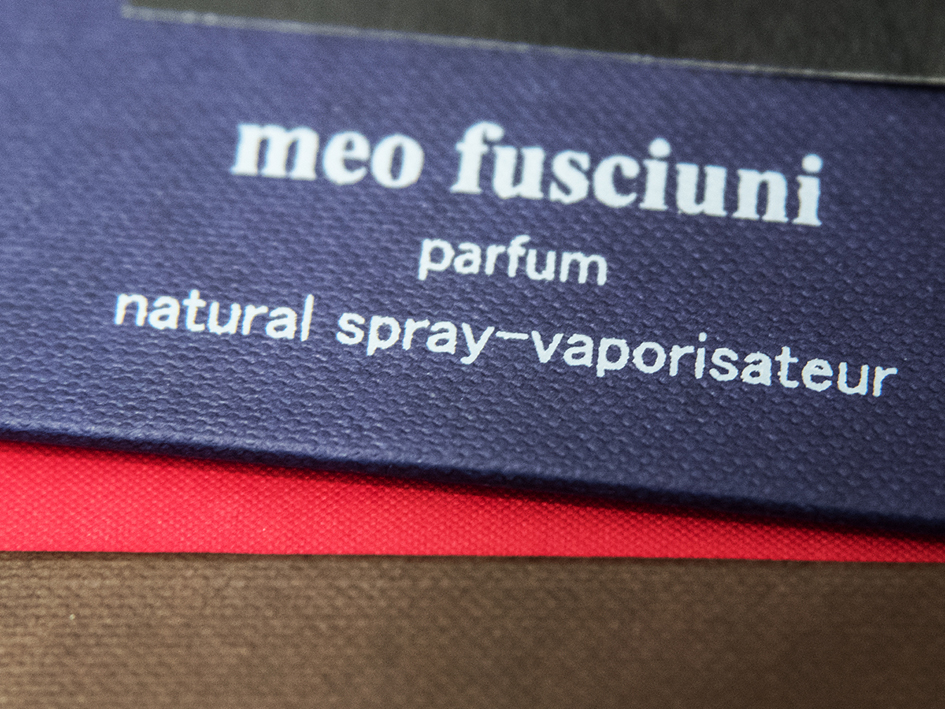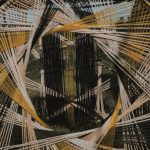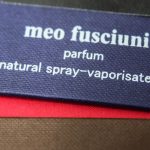Scroll down for English version
Mi rifugiavo sempre nella cantina di nonno, buia e umida, impregnata di vino, legno, terra e giornali.
Avevo otto anni, vivevo in campagna e la cantina era il mio posto preferito.
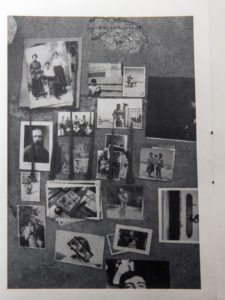
Fu così, che entrai per la prima volta in modo cosciente nell’infinito mondo degli odori, fortemente presenti nelle nostre vite, eppure così trascurati o spesso dati per scontati.
Sedici anni dopo scopro Meo Fusciuni e il suo di mondo, iniziando a cogliere la potenza evocativa che si concentra all’interno dei suoi flaconi.
Vengo subito rapita dalle sue storie, immedesimandomi. Dai suoi viaggi, dalle sue ricerche di memorie olfattive, come lui stesso le definisce.
Le parole di Meo inebriano l’anima, proprio come i suoi profumi la pelle.
Spinta dalla curiosità e dalla voglia di farvelo conoscere, gli chiedo di raccontarsi, di spiegare in poche parole, chi è Meo Fusciuni e cosa fa.
“Penso che raccontare in poche parole chi sono e cosa faccio non sia molto semplice da parte mia. Spesso mi capita di tralasciare alcuni dettagli importanti del mio cammino e delle diverse traiettorie che il mio oggi è e perché, ma solitamente, quando mi trovo in situazioni particolari e mi chiedono cosa faccio nella vita dico subito il “naso”, o profumiere, il creatore di profumi…
In realtà cerco memorie olfattive che raccontino la mia vita, la visione che ne ho d’essa, una ricerca continua, attraverso l’odore e l’emozione olfattiva.
Cosa ti ha spinto ad intraprendere la strada della profumeria artistica?
“Sono sicuro che sia stato il caso, una serie di accadimenti che posti uno accanto all’altro hanno fatto si che oggi mi trovi qui, a raccontarmi a te, come creatore di profumi. Volevo perdermi nei luoghi berberi, a raccontare episodi antropologici dell’uomo, invece sono qui, a raccontare episodi olfattivi della mia vita.
Il nostro è e rimarrà sempre un lavoro autobiografico.
Come nasce un profumo nel tuo caso – c’è prima la poesia e poi la fragranza o nascono assieme?
“Nel mio lavoro dapprima muto di odore, è la poetica a nascere per prima, la scintilla che nella ricerca interiore o nel viaggio fisico nasce e sviluppa l’idea. Poi questa prende forma dentro di me materializzandosi nella mia la struttura olfattiva. Da lì inizia la seconda fase, arrivare goccia dopo goccia al risultato finale, l’emozione olfattiva che racconti la storia che ho dentro me e che voglio far vivere a chi segue il nostro cammino. Il processo è molto lungo, circa un anno, che comprende anche la ricerca delle materie prime e la loro maturazione.
Considero la prima parte di questo processo la più difficile, perché cerchi l’immateriale dentro di te, nel tuo cammino, tutto può svanire e mai più ripresentarsi, ecco perché è una fase che vivo nella massima solitudine o almeno cerco di ritagliarmi molti momenti in cui mi allontano da tutto.”
I 100 ml di liquido odoroso non sono quindi semplici fragranze.
I profumi creati da Meo, sono veri e propri viaggi, reminescenze più o meno lontane pronte a far parte del quotidiano di chi sceglie di indossarle.
Nove memorie.
Nove momenti.
Nove esperienze
pronte a fondersi con quelle personali
e a plasmarsi assieme ai racconti e ai ricordi della propria pelle.
Mi racconta del cammino fatto fino a qui, diviso in quattro periodi.
Il primo racchiude la Trilogia del Viaggio, con i tre eau de parfum.
La 1# nota di viaggio – Rites de passage nasce ad Istanbul e ci accompagna tra la magia dei bazar e la nostalgia del ritorno.
La 2# nota di viaggio – Shukran rappresenta il viaggio fatto in Marocco, che sa di menta e tabacco.
La 3# e ultima nota di viaggio – Ciavuru d’amuri è stata concepita in Sicilia, nella sua terra d’origine, dove si mescolano l’odore di un caldo pomeriggio, assieme a quello inebriante del gelsomino, per poi dare spazio all’attesa della notte.
La Trilogia del Viaggio dà poi spazio al Ciclo della Poesia, composto da Notturno e Luce, i primi parfum.
Meo ci racconta Notturno composto da cinque momenti poetici autobiografici, da inchiostro e rhum, legno e frutta lasciata maturare a lungo.
Luce invece, in contrapposizione a Notturno, nasce da un percorso introspettivo, avvolto nella serenità e al sorgere di una nuova alba.
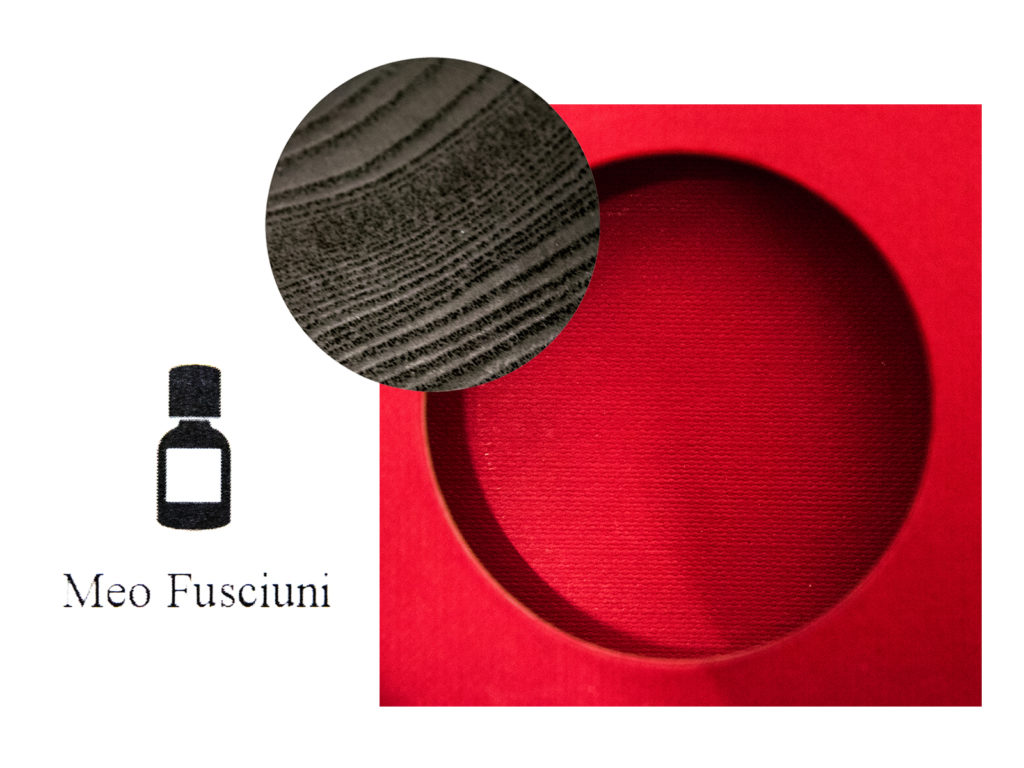
***
I always took refuge in my grandfather’s cellar, dark and wet, impregnated with wine, wood, earth and newspapers.
I was eight years old, I lived in the countryside and the cellar was my favourite place.
Thus I consciously entered for the first time into the infinite world of smells, strongly present in our lives, yet so often overlooked or taken for granted.
Sixteen years later I discovered Meo Fusciuni and his world, starting to grasp the evocative power that is concentrated within his bottles.
I was immediately captured by his stories, his travels, from his research through olfactory memories, as he defines them.
The words of Meo inebriate the soul, in the same way that his perfumes do to the skin.
Driven by curiosity and with the desire of introducing him to you all, I asked him to tell you, to explain in a few words, who Meo Fuscini is and what he does.
“I think that in a few words, who I am and what I do is not very simple. It often happens that I leave out some important details about my path and the different trajectories that made me as I am today and why, but usually, when I am in particular situations and get asked what I do for living I immediately say the “nose”, or perfumer, the perfume maker …
In reality I look for olfactory memories that describe my life, the vision I have of it, a continuous research, through smell and the olfactory emotion.
What motivated you to take the path of artistic perfumery?
“I’m sure it was the case, a series of events that placed side by side have brought me to where I am today, to tell you about me, as a creator of perfumes. I wanted to lose myself in Berber places, to describe the anthropological episodes of man, but instead I am here, to descrive the olfactory episodes of my life.
Ours is and will always remain an autobiographical work.
How is a perfume born in your case – does the poetry come first and then the fragrance, or are they born together?
“In my work, at first dumb with odour, it is poetry that first emerges, the spark that in the inner search or in the physical journey is born and develops the idea. Then this takes shape within me, the olfactory structure materializing in mine. From there begins the second phase, to reach the final result drop by drop, the olfactory emotion that tells the story that I have inside me and that I want to live for those who follow our path. The process is very long, about a year, which also includes the search of raw materials and their maturation.
I consider the first part of this process the most difficult, because you look for the immaterial inside of you, in your path, everything can vanish and never reappear, that’s why it’s a phase that I live in utmost solitude or at least try to carve out many moments in which I get away from everything. “
The 100 ml of scented liquid are therefore not simple fragrances.
The perfumes created by Meo, are real journeys, more or less distant reminiscences ready to be part of the daily life of those who choose to wear them.
Nine memories.
Nine moments.
Nine experiences
ready to merge with personal ones
and to mould together with the stories and memories of their skin.
He tells me about the journey made so far, divided into four periods.
The first contains the Trilogy of the Journey, with the three eau de parfum.
The # 1 travel note – Rites de passage was born in Istanbul and takes us between the magic of the bazaars and the longing to return.
The 2 # travel note – Shukran represents the trip made to Morocco, whit flavors of mint and tobacco.
The 3rd and last note of travel – Ciavuru d’amuri was conceived in Sicily, in his homeland, where the smell of a hot afternoon is mixed together with the inebriating smell of jasmine, to then give space to waiting for the night.
The Trilogy of the Journey then gives way to the Cycle of Poetry, composed of Nocturne and Light, the first perfumes.
Meo tells us Nocturne is composed of five autobiographical poetic moments, from ink and rum, wood and fruit left to mature for a long time.
Light on the other hand, in contrast to Notturno, arises from an introspective journey, wrapped in serenity and the dawn of a new day.
. . .

